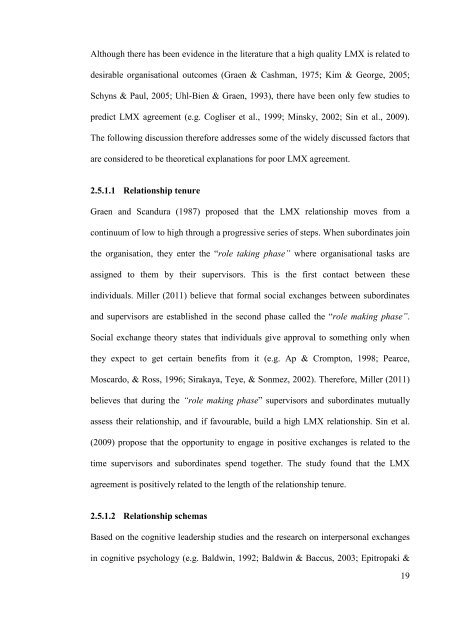View/Open
View/Open
View/Open
Create successful ePaper yourself
Turn your PDF publications into a flip-book with our unique Google optimized e-Paper software.
Although there has been evidence in the literature that a high quality LMX is related to<br />
desirable organisational outcomes (Graen & Cashman, 1975; Kim & George, 2005;<br />
Schyns & Paul, 2005; Uhl-Bien & Graen, 1993), there have been only few studies to<br />
predict LMX agreement (e.g. Cogliser et al., 1999; Minsky, 2002; Sin et al., 2009).<br />
The following discussion therefore addresses some of the widely discussed factors that<br />
are considered to be theoretical explanations for poor LMX agreement.<br />
2.5.1.1 Relationship tenure<br />
Graen and Scandura (1987) proposed that the LMX relationship moves from a<br />
continuum of low to high through a progressive series of steps. When subordinates join<br />
the organisation, they enter the “role taking phase” where organisational tasks are<br />
assigned to them by their supervisors. This is the first contact between these<br />
individuals. Miller (2011) believe that formal social exchanges between subordinates<br />
and supervisors are established in the second phase called the “role making phase”.<br />
Social exchange theory states that individuals give approval to something only when<br />
they expect to get certain benefits from it (e.g. Ap & Crompton, 1998; Pearce,<br />
Moscardo, & Ross, 1996; Sirakaya, Teye, & Sonmez, 2002). Therefore, Miller (2011)<br />
believes that during the “role making phase” supervisors and subordinates mutually<br />
assess their relationship, and if favourable, build a high LMX relationship. Sin et al.<br />
(2009) propose that the opportunity to engage in positive exchanges is related to the<br />
time supervisors and subordinates spend together. The study found that the LMX<br />
agreement is positively related to the length of the relationship tenure.<br />
2.5.1.2 Relationship schemas<br />
Based on the cognitive leadership studies and the research on interpersonal exchanges<br />
in cognitive psychology (e.g. Baldwin, 1992; Baldwin & Baccus, 2003; Epitropaki &<br />
19

















